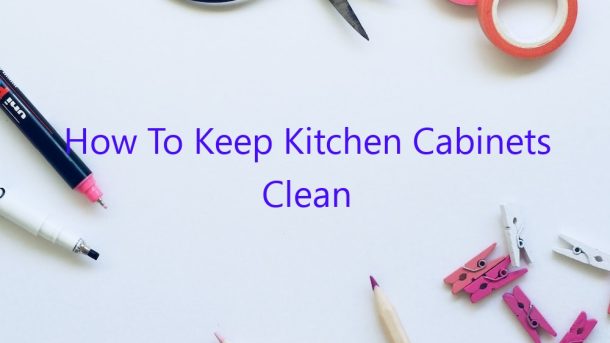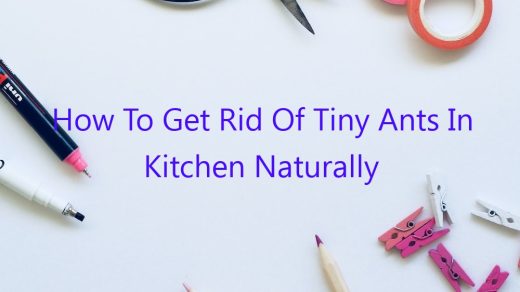Keeping your kitchen cabinets clean is a necessary part of kitchen maintenance. Not only does it make your kitchen look nicer, but it also helps keep your kitchen appliances and countertops clean. Here are some tips on how to keep your kitchen cabinets clean:
-Regularly wipe down your kitchen cabinets with a damp cloth to remove any dirt or dust.
-Use a kitchen cleaner to clean your kitchen cabinets. Be sure to read the instructions on the bottle carefully, as different kitchen cleaners can be harmful if used incorrectly.
-If you have any sticky or greasy spots on your kitchen cabinets, use a degreaser to remove them.
-To keep your kitchen cabinets looking new, consider using a sealant or wax on them every few months.
-If your kitchen cabinets are made from wood, be sure to regularly apply a wood conditioner to them to keep them looking healthy.
Contents
How do I protect my kitchen cabinets from stains?
Protecting your kitchen cabinets from stains can be a little tricky, but with a few simple steps, you can keep them looking great for years to come.
The first step is to make sure that you are cleaning your cabinets on a regular basis. everyday wiping and dusting will help to keep them looking new. If you do start to see a stain, you can try to wipe it up right away with a damp cloth.
If the stain is stubborn, you can try using a mild detergent or soap to help remove it. Be sure to test the detergent on a small, hidden area of the cabinet first to make sure it doesn’t damage the finish.
If the detergent doesn’t work, you can try using a commercial stain remover. Again, be sure to test it in a hidden area first to make sure it doesn’t damage the finish.
Finally, if all else fails, you can try to refinish your cabinets. This is a big job, but it can be well worth it in the end.
By following these simple steps, you can keep your kitchen cabinets looking great for years to come.
How do I maintain my kitchen cabinets?
Maintaining your kitchen cabinets is an important part of preserving their lifespan and keeping them looking their best. Here are a few tips on how to do so:
-Clean your cabinets regularly with a soft cloth and warm water. Be sure to remove any food or grease build-up, as this can cause damage over time.
-If your cabinets are made from wood, use a wood polish every few months to keep them looking shiny and new.
-If your cabinets are made from a different material, be sure to check the manufacturer’s instructions for cleaning and care instructions.
-If your cabinets are painted, be sure to touch up any chips or scratches as soon as possible to prevent them from becoming worse.
Following these tips will help keep your kitchen cabinets looking beautiful and lasting for many years to come!
How often should you wipe your kitchen cabinets?
Cleaning your kitchen cabinets is an important part of kitchen maintenance. Not only does it keep them looking clean and new, but it also helps to protect your food from contaminants.
How often you should wipe your kitchen cabinets depends on a few factors, including the type of cabinets you have, how often you cook, and how much dirt and grease accumulate on them. In general, most people recommend wiping kitchen cabinets down at least once a week.
If your cabinets are made of wood, you’ll need to be especially careful not to damage them with excessive moisture. In this case, it may be better to wipe them down every other week rather than every week.
If you have stainless steel cabinets, you’ll need to clean them less often, since they’re less likely to accumulate grease and dirt. Generally, stainless steel can be wiped down every two to four weeks.
No matter what type of cabinets you have, it’s important to be aware of the products you’re using to clean them. Some household cleaners can damage cabinets over time, so it’s best to use a mild, non-abrasive cleaner.
Ultimately, how often you should wipe your kitchen cabinets depends on how much dirt and grease accumulate on them. If they’re in good condition and don’t show any signs of dirt or grease buildup, you may not need to clean them as often. But if they’re dirty and greasy, you’ll need to clean them more often to keep them looking their best.
What is the best thing to clean kitchen cabinets with?
When it comes to cleaning kitchen cabinets, there are a variety of products that can be used. Some people may prefer to use a natural product such as vinegar, while others may prefer to use a chemical product. The following is a list of some of the best products to use to clean kitchen cabinets:
1. Vinegar: Vinegar is a natural product that can be used to clean kitchen cabinets. It is a strong acid that can be used to remove dirt, grease, and grime. Vinegar can also be used to remove stains from cabinets.
2. Ammonia: Ammonia is a chemical product that can be used to clean kitchen cabinets. It is a strong alkaline that can be used to remove dirt, grease, and grime. Ammonia can also be used to remove stains from cabinets.
3. Bar Keeper’s Friend: Bar Keeper’s Friend is a chemical product that can be used to clean kitchen cabinets. It is a mild acid that can be used to remove dirt, grease, and grime. Bar Keeper’s Friend can also be used to remove stains from cabinets.
4. Murphy’s Oil Soap: Murphy’s Oil Soap is a chemical product that can be used to clean kitchen cabinets. It is a mild soap that can be used to remove dirt, grease, and grime. Murphy’s Oil Soap can also be used to remove stains from cabinets.
5. Baking Soda: Baking Soda is a natural product that can be used to clean kitchen cabinets. It is a mild abrasive that can be used to remove dirt, grease, and grime. Baking Soda can also be used to remove stains from cabinets.
6. Soft Scrub: Soft Scrub is a chemical product that can be used to clean kitchen cabinets. It is a mild abrasive that can be used to remove dirt, grease, and grime. Soft Scrub can also be used to remove stains from cabinets.
How do you prevent kitchen grease build up?
Kitchen grease can be a nuisance, but it’s easy to prevent it from building up. All you need is a little bit of organization and some basic cleaning habits.
The first step is to make sure that you have a designated area for dirty dishes. If you have a dishwasher, make sure that you use it regularly. If you don’t have a dishwasher, make sure that you rinse your dishes off as soon as you’re done with them. If you let them pile up, the grease will build up quickly.
Another important step is to clean your stovetop and oven on a regular basis. Make sure that you use a degreaser to get all of the grease off of the surfaces. If you don’t clean the stovetop and oven regularly, the grease will build up and it will be difficult to get rid of it later.
You can also prevent kitchen grease from building up by using a vent hood. If you have a vent hood, make sure that it’s clean and that it’s functioning properly. If it’s not clean or if it’s not functioning properly, the grease will build up and it will be difficult to get rid of it later.
Finally, make sure that you clean your kitchen exhaust fan on a regular basis. The fan will help to get rid of the grease, but it will only work if it’s clean. If the fan is dirty, the grease will build up and it will be difficult to get rid of it later.
These are some of the best ways to prevent kitchen grease from building up. If you follow these tips, you’ll be able to keep your kitchen clean and grease-free.
Why are my kitchen cabinets sticky after cleaning?
There can be a few reasons why your kitchen cabinets are sticky after cleaning. Let’s take a look at some of the most common causes.
One possibility is that you didn’t use the correct cleaning product. If your cabinets are made from wood, you should use a gentle wood cleaner rather than a general all-purpose cleaner.
Another possibility is that you didn’t give the cabinets enough time to dry. If the cabinets are still wet when you start to cook, the heat and steam from the stove can cause them to become sticky again.
A third possibility is that there is still some residue left from the cleaning product. If this is the case, you can try wiping down the cabinets with a damp cloth to remove the residue.
If none of these solutions work, it may be time to call in a professional to take a look at your cabinets. They may need to be resealed or refinished.
How do I protect my new kitchen cabinets?
If you just installed new kitchen cabinets in your home, you’ll want to take some steps to protect them from damage. Here are a few tips:
1. Make sure your cabinets are sealed properly. If they aren’t, water can get in and cause damage over time.
2. Put a layer of protection on your cabinets. This can be a sealant, a coating, or even a wax. This will help protect them from scratches, dents, and other damage.
3. Clean your cabinets regularly. Dust and dirt can cause damage over time, so it’s important to clean them regularly.
4. Avoid using harsh chemicals or cleaning products on your cabinets. These can damage the finish and make them more susceptible to damage in the future.
5. Use coasters and placemats under dishes and glasses. This will help protect the finish of your cabinets from scratches and other damage.
6. Keep a close eye on your cabinets and repair any damage as soon as possible. This will help keep the damage from spreading and causing further damage.
By following these tips, you can help protect your new kitchen cabinets from damage and keep them looking beautiful for years to come.




